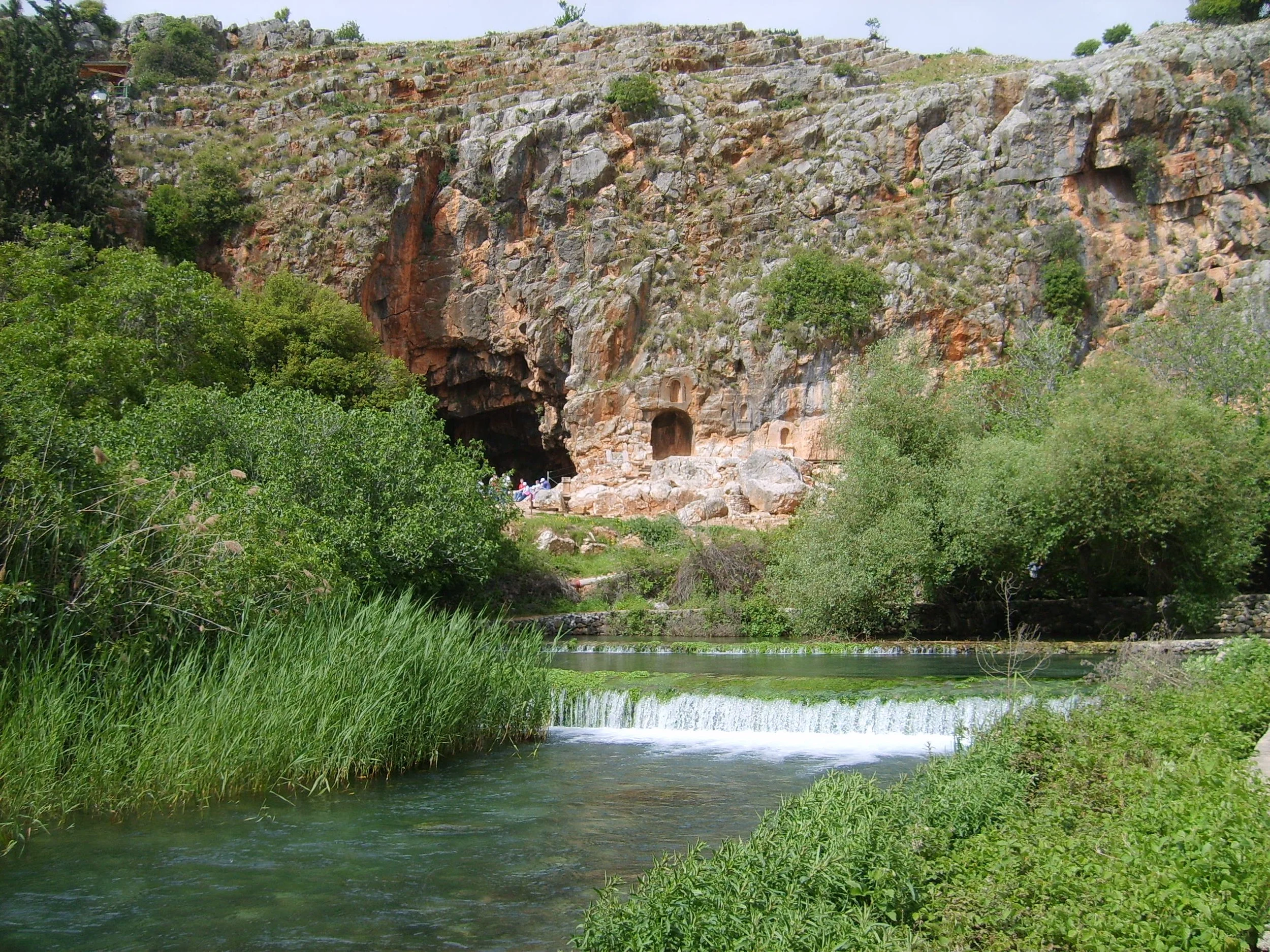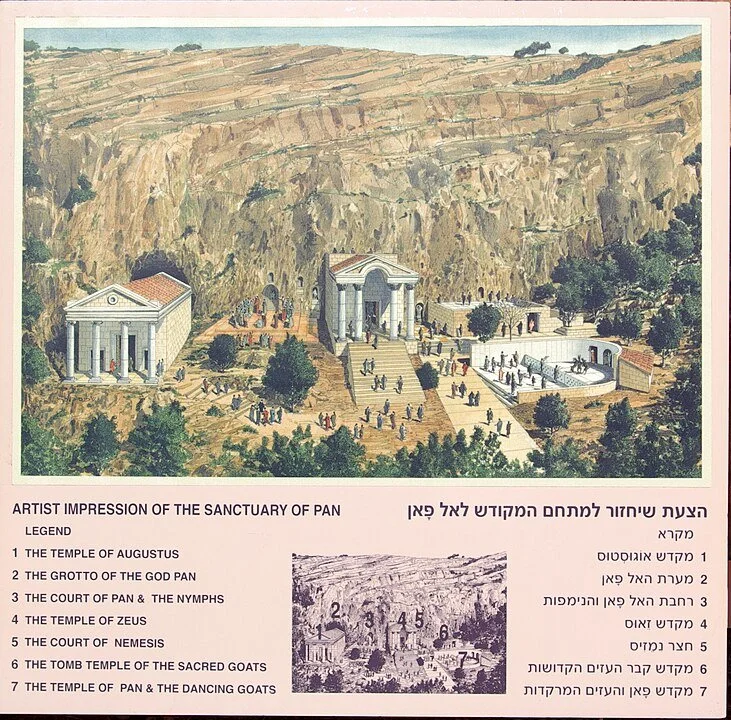Sermon for September 15, 2024 - The Seventeenth Sunday after Pentecost
Spring of Banias river, one of the main tributory of the Jordan River. In the background Pan's cave, in which the river originated in ancient times until an earthquake blocked it. By gugganij - Own work, CC BY-SA 3.0, https://commons.wikimedia.org/w/index.php?curid=3992796
I first visited the Holy Land 25 years ago, when I went with my diocesan youth group on a pilgrimage. It was during the month of July, and one of the most memorable days was when we got up early before the sun came up, while the city of Jerusalem was still cool, quiet, and sleeping. We drove north from Jerusalem, crossed a military checkpoint, and drove through the occupied West Bank and up through the Galilee, and even further north. By now the land was becoming more mountainous, and as we climbed, I remember the countryside started to change and look Alpine, very green, covered with beautiful flowers. And then suddenly, in the distance we caught sight of Mount Hermon, shimmering in the summer sun.
Eventually we arrived at our destination. On the very borders of Syria and Lebanon, we came to the village of Banyas, which marks the source of the river Jordan. It felt very remote, very beautiful. It was a far cry from the dusty hills of Jerusalem.
And it was that very place, way north of Galilee, in the mountains, that Jesus took his disciples on that momentous occasion recounted in our Gospel today. In his day, the place was called Caesarea Philippi.
We were planning on having the Eucharist at this holy site, and I was really looking forward to reading today’s Gospel at the very place where Peter confessed his faith in Jesus as the Messiah.
But what we hadn’t realized was that the day we were there, several other youth camps were there with us. And several hundred Jewish teenagers had also decided to come out for a day in the mountains!
I remember the adults huddled together weighing whether it was a wise idea to celebrate the Eucharist in the open air in these circumstances. We decided we would. We found a slightly quiet place just over a hill and began to worship.
It was an extraordinary and actually unforgettable experience to be celebrating the Eucharist, and reading today’s Gospel aloud in that place, with the sounds of thousands of Jewish people coming from just over the hill.
An artist's reconstruction of the Sanctuary of Pan. By Berthold Werner - Own work, Public Domain, https://commons.wikimedia.org/w/index.php?curid=5220822
As I reflected on the experience, I realized that Caesarea Philippi at the time of Jesus, was not an idyllic Alpine village, but a large Roman city. Jesus and his disciples would have been surrounded by crowds of people. “Who do these people say that I am?” Jesus asked his disciples. “Some say John the Baptist, but others Elijah, and still others, Jeremiah, or one of the prophets.”
He said to them, “But who do you say that I am?” And then comes the amazing intimate moment between two people. A moment of deep recognition. Jesus looks at his disciples, those who have been with him day and night over these past years. So, who am I? Simon looks at Jesus, and says “You are the Christ.”
And in Matthew’s version of this story, Jesus looks at Simon, and says to him, “You are Peter.” Petros, “the rock.” This difference is striking, in that Matthew’s later insertion of Jesus’ reply helps to round out the story. Taken together, this story cuts to the heart of identity, who and whose we are.
Two names, but more than names. Two vocations. Two men: one was called to be the anointed one of God. The other was called to be the rock on which the church of God was to be built. Each unique vocation was named, was articulated, was called forth.
It’s so often the case that it takes another person to help us know our own identity, our own vocation in life. “You two seem made for each other!” (Really?) A year before that pilgrimage, I was sitting in the waiting room of a medical clinic with my bishop at the time, Tom Shaw, and another adult waiting for a doctor to look at my twisted ankle. As we were sitting and waiting, Tom suddenly turns to me and says, “Have you ever thought about being a priest?” At first, I thought, surely you must be joking…But something changed in me. A seed was planted. Something had been named, was articulated, was called forth.
“You are the Christ.” “You are the rock.” And from that moment on everything changed.
After Caesarea Philippi, after the naming of vocations, Jesus and Simon each began the momentous journey toward the working out and fulfillment of their vocations.
For Jesus it was the moment where he turned his face to Jerusalem and began the long journey to the Cross. To fulfill his vocation, he would have to go to Jerusalem and undergo great suffering and be killed. To fulfill his vocation meant “emptying himself, taking on the form of a slave, humbling himself and becoming obedient, to the point of death, even death on a cross.” (Phil. 2:7-8)
For Simon, although he could never have guessed or imagined, to fulfill his vocation would demand a similar self-emptying. It would be a long journey for him, too. To become the rock on which Christ’s Church could be built, he would have to pass through terrible trials, he would deny Jesus three times. But only then, when he was weak and powerless, could he let Jesus forgive him, wash him, as he had tried to do at the Last Supper, restore him, and empower him with God’s strength. It was a hard lesson to learn.
What about your vocation? Your call? The people in your community, those whom you love and serve. The work you do, the life you live. Was there a person, like an angel, who spoke a word which changed your life? Spoke a word which named something, articulated it, called it forth?
Or have you had a moment or moments when you heard Jesus speaking directly to you, and asking you to make a decision of faith, “Who do you say I am?” You are the Christ.
Today, we remember this confession of faith, his confession of truth about himself and about Jesus. But it is also a good time to celebrate the confession of Rob, John, Precious, Vanessa. To celebrate your own confession of faith. How has God placed a call on your heart to love? Where do you feel you called to serve? How do your actions, each and every day, reflect the mission of Christ?
But I think it is also a great time to celebrate God’s confession of faith – God’s faith in you. In the quiet of this night, in the quiet of your prayers this week ask Jesus that same question about you. “Lord, who do you say that I am?” And I believe that God is longing for you to hear and to know in the very depth of your soul, that
“You are my beloved, in whom I am well pleased!”
Amen.



